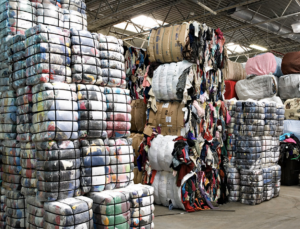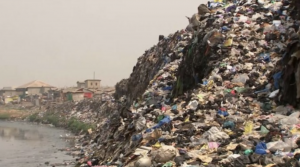Carolin Daubner
Another one of those 10-second videos of influencers dumping a mountain of cheap clothes on the floor, trying them on, and cheerfully recommending them with a 20% discount code. One click away from the latest trend, the dopamine rush, and the promised happiness that will arrive in a day with my package. Companies such as Shein, Zara, H&M, and Bershka are always finding new ways to entice us into buying new products,all thanks to those low, low prices. For us as individuals it may be cheap, but everything has a cost. Our excessive consumption causes problems not only in the disposal but also in the production. This article will follow the path of our unwanted clothes.
Globally, the clothing industry ranks first in e-commerce sales, which makes perfect sense, considering the increasingly accessibility of clothes which is enabling us to purchase greater amounts, so much so that Western consumers are buying 60% more than they were 15 years ago. However, these consumers do not realize, or choose to ignore, the environmental footprint the industry leaves behind. A staggering 6% of carbon emissions are attributed to the industry. Furthermore, it is a major contributor to global water pollution estimated at over 20%.
We don’t have to look far to find the beginning of the end of our clothes, often it even starts within the company itself.
After returning a clothing item that has only been tried on, it is simply not worth it for many manufacturers to bring it back into their system, due to additional costs such as those for transportation and repackaging, which leads them to decide to shred it or throw it away without giving it a second life, as the image of inclusion must also be maintained. In 2018, Burberry shamelessly revealed that they burn unworn clothes, accessories and perfume worth £28.6m to ‘protect the brand’. However, most of the time we are the ones who choose to send the clothes to its unfortunate doom.

The clothes are either thrown away directly into the trash or are donated or recycled, which implies that we are doing good for the environment and are compensating for our overconsumption. However, fast fashion is not made to be recycled, which is why recycling does not even account for 1% of the clothes thrown away. Clothing charities are overburdened with the massive amount of clothes, which are usually not a good quality, so here too a large part ends up in the normal trash. Only selected clothes can be found in our local second-hand stores.
Having established why and how we get rid of our clothes according to the saying “out of sight, out of mind”, the cycle of our clothes is far from over. The clothes that ended up in our trash will go to the landfill like many other trash items. However, the landfills in our country are already overflowing and since clothes take about two hundred years to decompose, they won’t get any smaller for the time being. And this happens despite the fact that so much garbage, including clothes, is sent to developing countries with the intention of helping them, however there, they often find their way to landfills again, as they too have too much. Clothes made of plastics like polyester or chemicals that are damaging our environment are on the rise. These substances eventually accumulate in our drinking water.
Especially in these other countries the extent of our consumption is to be grasped. There are numerous other environmental problems that are caused by not taking proper care of the disposal. In Bulgaria, for example, our clothes are illegally sold as fuel, releasing harmful fuels into the atmosphere. In Ghana, clothes often make it into the sea and form tangles of clothing, which makes fishing much more dangerous and difficult. So Ghana tried to ban the import of used clothing, not only for environmental reasons but also because importing ruined the country’s textile industry as national textile companies were replaced by foreign secondhand clothes.
Our clothes only stay in our possession for a relatively short fraction of their lifetime and mass producing clothings brands want us to continue our short-term ownership. Yet the impact of this practice is immense not only on the environment but on the vulnerable industries of the third world countries who are forced to bear the consequences of our decisions. So in order to put an end to the damage and exploitation that occurs with every clothes we as consumers need to change our mindset.

Despite the temptations and manipulations we are exposed to on social media and everyday life, we should be aware of the costs that went into disposing as well as the production of the clothes. One should consider alternatives and question à la Marie Kondo: Do I really need this? The answer is more often than not.
Works Cited
Alan Hudd. Dyeing for fashion: Why the clothes industry is causing 20% of water pollution. Euronews. Green. February 26, 2022. https://www.euronews.com/green/2022/02/26/dyeing-for-fashion-why-the-fashion-industry-is-causing-20-of-water-pollution.
Burberry burns bags, clothes and perfume worth millions. BBC News. July 19, 2018. https://www.bbc.com/news/business-44885983.
Elena Picci. What happens to your clothes when you throw them away?. Renoon. Last accessed Sep 8, 2022. https://renoon.com/blog/what-happens-to-your-clothes-when-you-throw-them-away.
Fast fashion: The dumping ground for unwanted clothes . BBC News. Posted October 10, 2021. https://www.youtube.com/watch?v=MHnDqelUh-4.
The Clothing Waste Crisis: How our Shopping Habits are Hurting the Planet. LX news. Posted Jan 25, 2020. https://www.youtube.com/watch?v=Bhi7S06pwv4.
The Environmental Disaster that is Fuelled by Used Clothes and Fast Fashion | Foreign Correspondent. Abc news in depth. Posted Aug 12, 2021. https://www.youtube.com/watch?v=bB3kuuBPVys&t=1215s.
Neda Sabbaghian. Used Clothes And What Happens When They’re Donated To The Goodwill And Other Charities. Fabswapp.July 26, 2016. https://www.fabswapp.com/environment/used-clothes-and-what-happens-when-theyre-donated-to-the-goodwill-and-other-charities/.
David Apinga. UK Export Of Trash To Ghana Creates 30-Ft Mountain Of Second-Hand Clothes In Accra. The Ghana Report. February 27, 2020. https://www.theghanareport.com/uk-export-of-trash-to-ghana-creates-30-ft-mountain-of-second-hand-clothes-in-accra/.
Carolin Daubner


